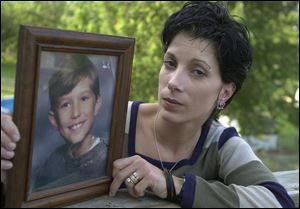
Parents urged to check out playmates' homes for guns
8/20/2001
John, the eldest son of Carole Price of Manchester, Md., was killed at a friend's house on Aug. 20, 1998, by a child playing with a handgun.
WASINGTON - Carole Price always asked lots of questions before allowing her three children to go to friends' houses.
“Will there be parental supervision?” “What will the kids be doing?” “Will they be watching television, and if so, what programs?”
But Ms. Price of Manchester, Md., never thought to ask whether her neighbors owned a gun and, if they did, whether it was safely stored away from children.
That changed on Aug. 20, 1998, the day her eldest child John was killed by a child playing with a gun at a friend's house.
Today, Ms. Price is a leader in a new national public awareness campaign designed to persuade parents to ask whether their neighbors have a gun in the home before allowing their children to go over to play.
The campaign, called ASK - Asking Saves Kids - was begun last fall as a collaboration between the American Academy of Pediatrics and PAX, a nonprofit group based in New York City. PAX officials say the campaign is a key part of their efforts to promote “practical, nonpolitical solutions'' to gun violence.
To draw more attention to the campaign, the groups have created the first national ASK day, set for today, the third anniversary of John Price's death. Events are planned in various cities, as well as a series of public service ads, all focused on convincing parents that asking about guns in the home should be as natural - and important - as asking about whether kids will be well-supervised.
“It could be a life-changing question,'' Ms. Price said in a recent interview. “You're not making a political statement. You're just being a good parent. Some people say it's an uncomfortable thing to ask. It's a lot more uncomfortable to be picking out your child's casket and headstone.''
Daniel Gross, the co-founder of PAX, said the ASK campaign is designed to “take the politics out of the gun violence issue'' and instead make it a public health issue. He pointed to studies that have shown that more than 40 percent of U.S. households with children have guns.
“We want to make this one of the many questions that parents ask when their children go to a friend's house to play,'' Mr. Gross said. “Through this campaign, we want to make it a natural thing to ask.''
Mr. Gross suggests that parents include the question about guns as a part of a series of questions about things they normally discuss with another parent before sending their child to someone's house. Parents should be polite, not confrontational or judgmental, Mr. Gross said.
If parents are told there is a gun in a house in which their children will be playing, “they have a couple of choices,'' Mr. Gross added. “One is to make sure that the gun is locked up safely, ideally in a gun safe. The other is to invite the friend to your house instead.''
National Rifle Association officials didn't respond to requests for comment on the ASK campaign. In previous statements, however, they have highlighted the organization's strong support for NRA education programs like “Eddie Eagle” as the best answer to keep children safe from guns.
But Dr. Howard Spivak, head of the American Academy of Pediatrics' task force on violence and a member of the PAX advisory board, said gun education programs like the “Eddie Eagle'' program give children too much responsibility for their own safety.
Such programs reflect “no understanding of children or child development,'' added Dr. Spivak, a pediatrics professor at Tufts University Medical School.
“Young children don't have the cognitive ability to make the kinds of connections about actions and outcomes that we adults try to impose on them. They just don't get it. Neither do teens.''
Dr. Spivak added that the barrage of violence in television and movies - especially the fact that “there's rarely any pain shown'' - also makes it difficult for children to take seriously the danger of guns.
“Even if we try to teach children about the danger of guns, every other exposure they have to guns teaches them the opposite,'' Dr. Spivak said.
Note: For more information on the ASK campaign, and to get a copy of a parent “kit,'' go to www.askingsaveskids.com. The Web site also contains information about the related TELL campaign, which is aimed at persuading students to dial 911 or school officials if they know of a gun or other threat at their school.